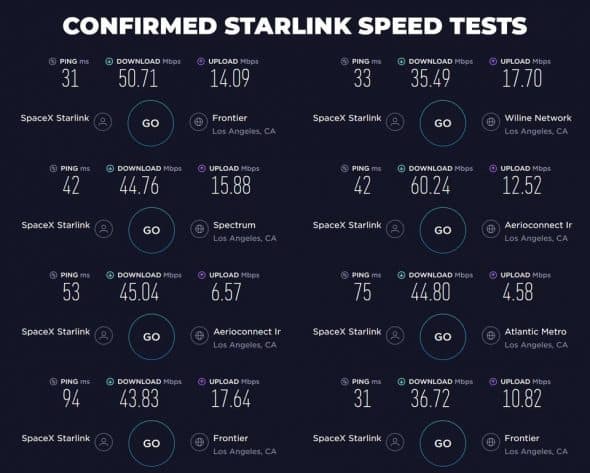 SpaceX’s Starlink service is unlikely to compete in the same arena as fiber and cable internet service providers, if leaked early speed test results are an accurate indication of the service’s performance.
SpaceX’s Starlink service is unlikely to compete in the same arena as fiber and cable internet service providers, if leaked early speed test results are an accurate indication of the service’s performance.
A sub-Reddit for Starlink, the low earth orbiting (LEO) satellite internet service, is buzzing with activity after one or more anonymous users in Washington State shared speed test results in a public forum, in apparent violation of the non-disclosure agreement SpaceX insists alpha testers sign.
Starlink’s current alpha test, open to rural areas in Washington State only, will give SpaceX data on how well the platform performs in the marketplace. As beta tests begin later this year, testers will be required to have an unobstructed view of the northern sky, live within 44 and 52 degrees latitude, be willing and able to complete multiple surveys about the service over a two-month period, and agree to receive and properly install the equipment. All alpha and beta testers will receive the service for free, but will be asked to pay $1 to test Starlink’s billing system.
Testers are supposed to keep information about their Starlink experiences private, as per a detailed non-disclosure agreement that each tester must sign. But anonymous leaks about the service, along with ‘telling’ questions, have frequently appeared in a public forum about the satellite service, frustrating SpaceX. The satellite provider has reportedly issued multiple “takedown requests” to remove violating content.
Last week, Starlink began requesting more detailed information from those seeking to enroll in future beta tests, a sign it is gearing up to test the service more widely soon.

So far, Starlink testers in Washington State willing to leak their experiences are reporting download speeds no better than 60 Mbps, with upload speed averaging between 10-15 Mbps. Latency, a constant problem with satellite internet, was a more impressive 50 ms on average, but can vary between 31-94 ms.
Only a small number of people in Washington State are estimated to be taking part in current trials, which started before SpaceX’s entire satellite fleet is in orbit. SpaceX previously claimed the service was designed to deliver “blazing fast speeds” up to 1,000 Mbps. That clearly is not happening at the moment. Some testers have been told that speed will increase as more satellites are placed into orbit, but others are wondering if early results are good enough, especially considering they are conducted on satellite infrastructure that currently has a light load with almost no users.
Starlink’s speed and performance will be crucial indicators of how the broadband industry will respond to the emerging market of LEO-based satellite internet. If 60/10 Mbps service is what many users can expect to get, that might deflate SpaceX’s boasts that its Starlink platform could be a competitive game-changer. Cable and fiber providers will likely dismiss Starlink as a serious competitor in the urban and suburban markets they serve, noting wired internet performance is already considerably faster. Still, the project could provide much-needed internet service in exurban and rural areas bypassed by cable companies, leaving consumers with a current choice of <10 Mbps DSL from the phone company or no service at all.


 Subscribe
Subscribe